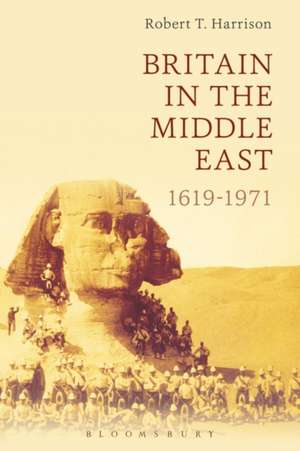Britain in the Middle East: 1619-1971
Autor Dr Robert T. Harrisonen Limba Engleză Paperback – 4 mai 2016
| Toate formatele și edițiile | Preț | Express |
|---|---|---|
| Paperback (1) | 180.44 lei 6-8 săpt. | |
| Bloomsbury Publishing – 4 mai 2016 | 180.44 lei 6-8 săpt. | |
| Hardback (1) | 716.63 lei 6-8 săpt. | |
| Bloomsbury Publishing – 4 mai 2016 | 716.63 lei 6-8 săpt. |
Preț: 180.44 lei
Preț vechi: 207.96 lei
-13% Nou
Puncte Express: 271
Preț estimativ în valută:
34.53€ • 35.92$ • 28.51£
34.53€ • 35.92$ • 28.51£
Carte tipărită la comandă
Livrare economică 14-28 aprilie
Preluare comenzi: 021 569.72.76
Specificații
ISBN-13: 9781472590718
ISBN-10: 1472590716
Pagini: 304
Dimensiuni: 156 x 234 x 17 mm
Greutate: 0.43 kg
Editura: Bloomsbury Publishing
Colecția Bloomsbury Academic
Locul publicării:London, United Kingdom
ISBN-10: 1472590716
Pagini: 304
Dimensiuni: 156 x 234 x 17 mm
Greutate: 0.43 kg
Editura: Bloomsbury Publishing
Colecția Bloomsbury Academic
Locul publicării:London, United Kingdom
Caracteristici
Explains how Britain's continuing informal influence, and past involvement, can help explain the contemporary Middle East
Notă biografică
Robert T. Harrison is Professor of History at Southern Oregon University, USA. He is the recipient of a Fulbright Fellowship and has over 30 years' experience of teaching and researching in the field of British imperialism in the Middle East.
Cuprins
Introduction1. Getting Started: The Search for Trade, 1555-17632. The Impact of the Seven Years War: Victory, Power and Dominance to 17973. The Napoleonic Wars and the Search for Regional Security, 198-18154. Expanded British Influence in the Persian Gulf, Red Sea and Egypt, 1815-18415. The 'Great Game' and Afghanistan, 1838-18426. The 'Eastern Question' and the Crimean War and its Causes, 1838-18567. The Question of Egypt, 1838-18798. The Invasion of Egypt, the Turning Point and Direct Control, 18829. Intervention's Aftermath and the Imperial Scramble, 1883-191410. The First World War, the Mesopotamian and Palestinian Campaigns and Treaty-Making, 1914-191811. War's Aftermath: The Watershed, 1918-192212. Tenacity Enshrined: Holding on, 1922-194013. Britain's 'Defense-Offense' in the Middle East in the Second World War, 1939-194514. The End of the Road: Exit from Empire, 1945-197115. ConclusionBibliographyIndex
Recenzii
This entertaining book presents a breathless romp through the many misguided, dishonest, and ill-fated ventures of the British in the Middle East. Writing in a style that younger undergraduates will probably find appealing, Harrison (Southern Oregon Univ.) adopts an informal and colloquial manner of presentation that characterizes, for example, Egypt as "the jugular vein of the British Empire," or the possible outcome of a British policy proposal as "no harm, no foul." Social and cultural historians might decry the book because it is an unabashedly old-fashioned, straightforward diplomatic and military history. Nevertheless, Harrison does not shy away from providing copious illustrations of the duplicity and deceit practiced by British politicians and diplomats. In this, however, the British were not alone. Middle Eastern politics necessarily drew in the Ottoman Turks, French, Germans, Americans, and Russians. None of these actors emerge with any dignity. Summing Up: Highly recommended. Public, general, and undergraduate libraries.
Harrison is to be commended for making such an important subject highly accessible to students and scholars at all levels. His work is a welcome addition to the literature on both British history and the modern Middle East.
In this succinct, sweeping, and spirited chronicle of Britain's expansion into the Middle East and its ultimate retreat from the region, from the founding of the East India Company in the seventeenth century to the exit from Aden in the twentieth, Harrison expertly emphasizes trade, treaty-making, protectorates, costly military contests and wars, and European and indigenous rivalries. An imperial ideology identified the nation's very survival with the defense of empire in the Middle East, especially in the strategic key, Egypt. Besides exploring the pivotal roles of British leaders, such as Palmerston and Churchill, Harrison examines critiques of British behavior by local influentials, such as Tewfiq and Ali. Britain's legacy in the Middle East is mixed, argues Harrison. Through informal and formal means, Britain helped blunt the ambitions of other imperial powers in the region but suffered financial ruin at home while alienating the people of the Middle East and stimulating today's political volatility.
Meticulously researched and vividly written, this is a superb historical narrative that illuminates the origins of many issues confronting the Middle East and the international community today. Harrison accomplishes admirably his objective of providing fresh analysis of the expanse of British informal influence and dominance in the Middle East from its origins in the seventeenth century through its painful withdrawal following the Second World War. Never losing sight of his larger purpose, he includes telling detail and profiles of key individuals that support his arguments. He invariably sees the forest for the trees and inspires others to do the same.
Harrison provides a fresh and critical survey of a big topic. By distinguishing between British "informal' and "formal rule", Harrison makes some valuable points, but he also recognizes that British identifying themselves with empire, relying heavily on various native and European elites and mercenary minorities, often humiliated Muslim majorities, a legacy that gets much more attention these days.
Harrison is to be commended for making such an important subject highly accessible to students and scholars at all levels. His work is a welcome addition to the literature on both British history and the modern Middle East.
In this succinct, sweeping, and spirited chronicle of Britain's expansion into the Middle East and its ultimate retreat from the region, from the founding of the East India Company in the seventeenth century to the exit from Aden in the twentieth, Harrison expertly emphasizes trade, treaty-making, protectorates, costly military contests and wars, and European and indigenous rivalries. An imperial ideology identified the nation's very survival with the defense of empire in the Middle East, especially in the strategic key, Egypt. Besides exploring the pivotal roles of British leaders, such as Palmerston and Churchill, Harrison examines critiques of British behavior by local influentials, such as Tewfiq and Ali. Britain's legacy in the Middle East is mixed, argues Harrison. Through informal and formal means, Britain helped blunt the ambitions of other imperial powers in the region but suffered financial ruin at home while alienating the people of the Middle East and stimulating today's political volatility.
Meticulously researched and vividly written, this is a superb historical narrative that illuminates the origins of many issues confronting the Middle East and the international community today. Harrison accomplishes admirably his objective of providing fresh analysis of the expanse of British informal influence and dominance in the Middle East from its origins in the seventeenth century through its painful withdrawal following the Second World War. Never losing sight of his larger purpose, he includes telling detail and profiles of key individuals that support his arguments. He invariably sees the forest for the trees and inspires others to do the same.
Harrison provides a fresh and critical survey of a big topic. By distinguishing between British "informal' and "formal rule", Harrison makes some valuable points, but he also recognizes that British identifying themselves with empire, relying heavily on various native and European elites and mercenary minorities, often humiliated Muslim majorities, a legacy that gets much more attention these days.






